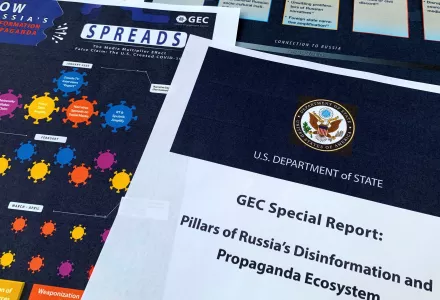
How China and Russia Use Intelligence Agencies to Undermine America
The Cold War never ended. That, at least, is Russian President Vladimir Putin's view. The clearest indication that the Kremlin continued its titanic struggle against the West even after the Soviet Union collapsed can be seen in the activities of Russia's security and intelligence services. In their operations and in the vast power they wield in Russian society, they have picked up where Soviet intelligence left off. Since 1991, these agencies have been driven by a revanchist strategy to make Russia great again and to overturn the post–Cold War U.S.-led international order. Putin's war in Ukraine is the bloody conclusion of that strategy.
China is also seeking to reverse the outcome of the Cold War. With the "no limits" alliance proclaimed on the eve of Russia's invasion of Ukraine, Putin and China's leader, Xi Jinping, are attempting to upend the international system—and they are leaning heavily on their intelligence organs to do so. Spy agencies can do what other branches of government cannot: execute non-avowed foreign policy. Both Russian and Chinese intelligence have done so in the furtherance of their revisionist goals, taking advantage of the United States while it was distracted by the "war on terror" to damage U.S. national security, undermine Western democracies, and steal as many scientific and technical secrets as possible.
ALL THE TSAR'S MEN
Russia's intelligence services view themselves as the direct heirs of the KGB. Although the KGB was disbanded in 1991, many of its former officers and all of its tradecraft, files, and even agents in the West were transferred to Russia's new security service, now known as the FSB, and foreign intelligence service, the SVR. For years after the end of the Cold War, Russian intelligence continued to run former Soviet agents in the West, including the CIA counterintelligence official Aldrich Ames and the FBI agent Robert Hanssen. It was business as usual for Russia. The SVR's first director, KGB veteran Yevgeny Primakov, continued the Soviet intelligence agency’s traditions of coercion and blackmail—tactics that he himself had fallen victim to as a young man. According to material smuggled from the KGB's archives, Primakov had been blackmailed into serving the agency while working as a journalist in the Middle East in the 1960s. The founding father of the FSB, Rem Krassilnikov, was also a former KGB officer and communist true believer; his wife was named Ninel, which is Lenin spelled backward. According to an FSB defector who worked under Krassilnikov in the 1990s, the FSB used the same training manuals as the KGB, but with the ideological sections about communism simply ripped out.
Then there is Putin himself, whose experience in the KGB's foreign intelligence directorate profoundly shaped his subsequent political career. While stationed in Dresden in East Germany—a KGB sideshow, since the real action was in East Berlin—Putin witnessed the Soviet empire's disintegration firsthand. It was, as he later said, the greatest catastrophe of the twentieth century. Putin calls himself a "Chekist," in honor of the early Soviet secret police, the Cheka, and had a statue of Cheka founder Felix Dzerzhinsky in his office when he was the FSB director. To this day, Putin walks with the gunslinger gait of an FSB man, left hand swinging but right hand motionless next to an invisible side arm, to let everyone know he’s trained....
Walton, Calder. "The New Spy Wars." Foreign Affairs, (July 19, 2023)
The full text of this publication is available via Foreign Affairs.




